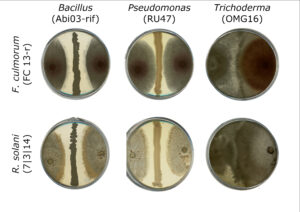Beneficial microorganisms
The beneficial effects of several plant-associated microorganisms on plant performance and disease suppression are well described (Chowdhury et al. 2015, Schreiter et al. 2018). Application of beneficial microbes to the soil/ rhizosphere is recognized as an alternative to pesticide use and aims to improve plant vigour (growth, health). To clarify the benefits of using beneficial microbes to support plant health, we aim to evaluate the effects of long-term farming practices on the performance of inoculated beneficial microorganisms in the field. We want to answer the question how the inoculation with beneficial microbes effects the composition of the native rhizosphere microbiota and thereby contribute to an improved plant-soil-feedback.
Recent findings showed that the combined application of beneficial microbes with different modes of action can enhance plant defence responses compared to inoculation with a single beneficial microbial strain and withstand environmental stresses to a greater extent. Therefore we will evaluate the effects of inoculating a Pseudomonas strain (RU47) in combination with a Bacillus strain (B. atrophaeus ABi03) on plant traits depending on farming practice. Because of its different mode of action and habitat, we will also include a Trichoderma strain (T. harzianum OMG16) in our consortium of beneficial microbes. We evaluate the impact of the consortium of beneficial microbes on plant growth as well as plant health, including analysis of microbial consortium composition, gene expression analysis and metabolic profiles.


Inoculation of young maiz plants with a consortium of beneficial microorganisms. (Image: IGZ)